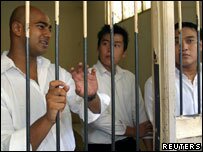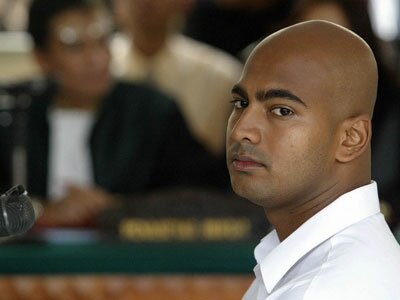|
Prosecutors in Bali have recommended the death sentence for one of the alleged ringleaders of a group of nine Australians charged with heroin smuggling. Life sentences have been sought for two other defendants, while sentence demands will also be made against the remaining five this week.
 All nine, being tried separately, are due to be sentenced within the next four weeks. The three alleged organizers are widely expected to receive the death penalty, while life sentences are expected for at least four the remaining six. All nine, being tried separately, are due to be sentenced within the next four weeks. The three alleged organizers are widely expected to receive the death penalty, while life sentences are expected for at least four the remaining six.
The nine were arrested on April 17, 2005, accused of involvement in a plan to smuggle more than 8.2 kilograms of heroin into Australia. Four of them, dubbed "drug mules" by the Australian media, were apprehended at Ngurah Rai International Airport with a total of nearly 8 kilograms of heroin strapped to their bodies. The fifth, one of the alleged ringleaders, was arrested while on a plane about to depart for Sydney. The other four were nabbed at the Melasti Bungalows near Kuta Beach in Denpasar, where police found two bags of heroin weighing more than 300 grams.
Chief prosecutor David Adji on Tuesday (24/1/06) told Denpasar District Court that Myuran Sukumaran (24), who was arrested at the Melasti Bungalows, deserved the death penalty because he was involved in leading the planned heroin trafficking operation and had shown no remorse for actions.
"We ask the panel of judges presiding over this case to find the defendant legitimately and convincingly guilty of the criminal action of exporting Class 1 narcotics in an organized manner and without permission; and to hand down the death sentence against the defendant," Adji was quoted as saying by detikcom online news portal.
Sukumaran, a martial arts expert from Sydney, had been composed throughout most of the hearing, but appeared startled and then momentarily dejected after the interpreter informed him the prosecution had recommended the death sentence.
With his shaved head and strong build, Sukumaran is an imposing figure. Australian media reports have described him as "the enforcer" of the drug operation.
At a separate hearing on Tuesday, Adji asked judges to give the life sentence to Michael William Czugaj (20) of Brisbane for his role as a courier in the operation. He said Czugaj should be spared the death penalty because the defendant had been cooperative, showed remorse for his actions and was still young.
 On Monday, prosecutors also recommended the life sentence for Scott Anthony Rush (20), another of the four couriers arrested at the airport. On Monday, prosecutors also recommended the life sentence for Scott Anthony Rush (20), another of the four couriers arrested at the airport.
Adji said Sukumaran received the maximum sentence demand because he had given obstructive statements that hindered the course of his trial, so there were no grounds for leniency. The prosecutor also said Sukumaran had arranged funds, hotel bookings and directions for the four couriers: Czugaj, Rush, Renae Lawrence and Martin Eric Stephens.
After the hearing, Adji said it was the first time he had recommended the death penalty. Executions are carried out in Indonesia by firing squad.
The death penalty is expected to be sought for Sukumaran’s two alleged partners: Andrew Chan (21) from Sydney and Tan Duc Than Nguyen (23) from Brisbane.
If judges agree with the demands, Sukumaran, Chan and Nguyen will become the first Australians to be sentenced to death by an Indonesian court. The court has heard that Chan was the financier of the operation and that Nguyen recruited couriers Czugaj and Scott.
The two remaining couriers, Lawrence (28) and Stephens (29), will hear their sentence demands on Wednesday, as well as three of the four arrested at the Melasti Bungalows: Nguyen, Matthew James Norman (19) and Si Yi Chen (23). Chan's sentence demand will be made Thursday.
Adji said Sukumaran and Chan had strapped heroin to four of the couriers’ bodies and threatened them not to pull out of the operation. The mules have testified that Sukumaran and Chan threatened to kill them and their families if they refused to take the heroin to Sydney.
Assistant prosecutor Olopan Nainggolan said Sukumaran’s actions had damaged Bali's image as a tourist resort and violated the government’s anti-narcotics policy.
Sukumaran's lawyer Mohamad Rifan complained that Australian Federal Police had tipped off Indonesian authorities to the presence of the nine. "One of the reasons my client is being charged with the death penalty is the letter from the Australian Federal Police. The AFP should be proud with an Australian citizen being charged in Bali because of their letter," he was quoted as saying by The Sydney Morning Herald.
The prosecution had focused too heavily on evidence presented against Sukumaran by the four couriers, whose statements should have been inadmissible, said Rifan. "This is not strong grounds for a death sentence request," he was quoted as saying by The Australian daily. He further claimed he had not had enough time to present his defense.
Czugaj's lawyer Fransiskus Passar said the life imprisonment demand for his client was "too heavy" so he would ask judges to hand down "a minimal sentence" when the trial resumes on February 7.
Australia, which opposes capital punishment, has said it would protest if any of the nine receive death sentences. Attorney General Abdul Rahman Saleh is therefore authorizing the sentence demands due to the sensitivity of the cases.
Foreign Affairs Minister Hassan Wirajuda has acknowledged that any death sentences are likely to spark a public outcry in Australia. But he said the verdicts are unlikely to hurt bilateral relations because the Australian government understands that the trials are a domestic affair of Indonesia.
In Canberra, Australian Prime Minister John Howard said he would not take any kind of action until the verdicts have been handed down. "I don’t think anything is served by me giving a serial reaction to each decision. If there is anything that can be properly put to the relevant authorities by the Australian government after the sentencing procedures have been exhausted then that will occur. I am simply not going to respond in a commentary like fashion on each and every decision. That is not helpful, it is not sufficiently respectful towards the Indonesian justice system," he said.
The four mules had tried to sue the AFP, claiming the police’s tip-off to Indonesian authorities breached Australian law because it exposed them to the death penalty to which Australia is opposed. But the Australian Federal Court this week dismissed their application to access AFP documents to see if they had grounds to launch a court challenge. The court said the challenge was purely speculative and had no prospects of success.
Meager Support
Although many Australians vociferously opposed last year’s jailing of Australian woman Schapelle Corby for marijuana trafficking, there has been noticeably less support for the Bali Nine.
One of the groups supporting the Bali Nine is the Network Against Prohibition (NAP), which describes itself as a drug law-reform organization. Also offering support is the Foreign Prisoner Support Service.
An online petition for the Bali Nine has so far attracted fewer than 100 virtual signatures (as of January 24), with comments being a mixture of support, derision and abuse.
One Australian satirical publication has produced a spoof article describing the Bali Nine and other Australians arrested in Indonesia as contestants on a television reality show.
Only 4 Executions For Drugs, So Far
Indonesia has officially executed only four people for drug-related offenses although many others – mostly foreigners – are now on death row for narcotics crimes.
Malaysian national Chan Ting Chong alias Steven Chong was executed in 1995, almost 10 years after he was sentenced to death in 1986 by West Jakarta District Court for heroin possession.
Indian citizen Ayodhya Prasad Chaubey (66) was executed in August 2004 after being sentenced to death in 1994 by Medan District Court, North Sumatra, for heroin smuggling.
Thai nationals Saelow Praseart (62) and Namsong Sirilak (32) were executed in October 2004 after being sentenced to death in 1994 by Medan District Court for heroin smuggling.
Critics complain that Indonesia's notoriously corrupt courts have failed to mete out similar harsh justice to members of the security forces allegedly involved in narcotics trafficking. There are also complaints that children of powerful military officers and politicians are rarely punished, let alone put to death, for drug offenses.
Indonesia is among 90 countries that impose the death penalty, but data from Amnesty International shows that most of the world's executions are carried out by only a handful of countries: China, Iran, Saudi Arabia and the US.
Capital offenses in Indonesia include: terrorism, crimes against national security, subversion, assassination of senior state officials, murder, theft resulting in murder, gross human rights violations, maritime piracy and drug offenses.
Prisoners sentenced to death by civilian or military courts have the right to appeal to a higher court and then the Supreme Court. A request for presidential clemency can be made immediately after the initial sentence, but is usually made only if courts of appeal uphold the death sentence.
|